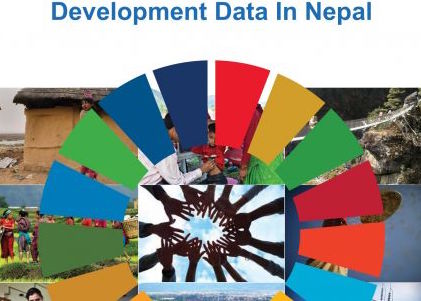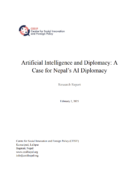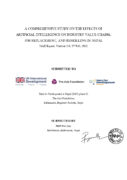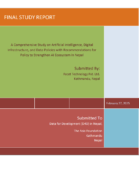
Data Portal – Nepal Open Taxation Data
September 1, 2018
The 2018 Data for Development Innovation Fund is accepting proposals — Apply now!
September 20, 2018Report - Assessing development data in Nepal
Partner: Bikas Udhyami
Link: A Study into Development Data in Nepal
To better understand the Nepal’s national statistical system and the availability of development data in Nepal for decision-making and monitoring development progress, the D4D Program supported Bikas Udhyami to conduct a development data audit.
Sustainable development requires evidence-informed decision-making on resource allocation, policy and service delivery at federal, provincial and local spheres of government. This requires a sustainable flow of timely and reliable data. Unfortunately, in many countries, national statistical systems are not adequately equipped to provide the data necessary for informing development decisions and measuring development progress. In late 2017 Bikas Udhyami undertook a study to examine Nepal’s statistical system. By assessing the strengths, weaknesses and delivery of data production in Nepal the study aimed to determine whether the available data sources fulfil the demands for implementing and monitoring the Sustainable Development Goals (SDGs).
Informed by a literature review and key informant interviews the study examines the organization and delivery of Nepal’s statistical system. This includes a review of data governance in Nepal (including an overview of key actors, the legal framework, national policies, resources), the data infrastructure (including ICT and capacity), the data sources, and data accessibility. To support this, a database of primary development data available in Nepal was collected and mapped against the SDG indicators. The methodology for this study has been based on the Data Development Assessment methodology designed by Development Initiatives which was adapted to the Nepali context. Using this methodology the study examines the effectiveness of Nepal’s statistical system and also assesses the adequacy of current data sources to monitor the indicator framework provided by the SDGs.
Among the key findings, the study finds that Nepal’s statistical system is highly fragmented and coordination among data producers is limited. Whereas Nepal’s legal framework provides for access to information, the sharing of data is still not common practice and the government shares limited data publicly online in machine readable formats. The study finds that much needs to be done to improve data access, affordability, security, digitization, and synergies, and that, although the demand for and the use of data is increasing, the practice of using data is still in its formative stage. The study finds that the major data sources for informing development decisions are data from civil registries, censuses, administrative systems and surveys and that, although the government has started to mainstream the SDGs into national level budgeting and planning, there are significant data gaps preventing accurate monitoring of SDG progress – in particular in the availability of disaggregated open data.
The study can be accessed here.
Link: A Study into Development Data in Nepal
To better understand the Nepal’s national statistical system and the availability of development data in Nepal for decision-making and monitoring development progress, the D4D Program supported Bikas Udhyami to conduct a development data audit.
Sustainable development requires evidence-informed decision-making on resource allocation, policy and service delivery at federal, provincial and local spheres of government. This requires a sustainable flow of timely and reliable data. Unfortunately, in many countries, national statistical systems are not adequately equipped to provide the data necessary for informing development decisions and measuring development progress. In late 2017 Bikas Udhyami undertook a study to examine Nepal’s statistical system. By assessing the strengths, weaknesses and delivery of data production in Nepal the study aimed to determine whether the available data sources fulfil the demands for implementing and monitoring the Sustainable Development Goals (SDGs).
Informed by a literature review and key informant interviews the study examines the organization and delivery of Nepal’s statistical system. This includes a review of data governance in Nepal (including an overview of key actors, the legal framework, national policies, resources), the data infrastructure (including ICT and capacity), the data sources, and data accessibility. To support this, a database of primary development data available in Nepal was collected and mapped against the SDG indicators. The methodology for this study has been based on the Data Development Assessment methodology designed by Development Initiatives which was adapted to the Nepali context. Using this methodology the study examines the effectiveness of Nepal’s statistical system and also assesses the adequacy of current data sources to monitor the indicator framework provided by the SDGs.
Among the key findings, the study finds that Nepal’s statistical system is highly fragmented and coordination among data producers is limited. Whereas Nepal’s legal framework provides for access to information, the sharing of data is still not common practice and the government shares limited data publicly online in machine readable formats. The study finds that much needs to be done to improve data access, affordability, security, digitization, and synergies, and that, although the demand for and the use of data is increasing, the practice of using data is still in its formative stage. The study finds that the major data sources for informing development decisions are data from civil registries, censuses, administrative systems and surveys and that, although the government has started to mainstream the SDGs into national level budgeting and planning, there are significant data gaps preventing accurate monitoring of SDG progress – in particular in the availability of disaggregated open data.
The study can be accessed here.




